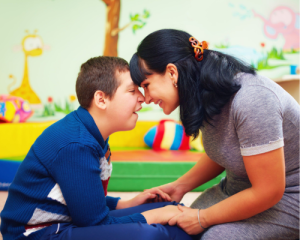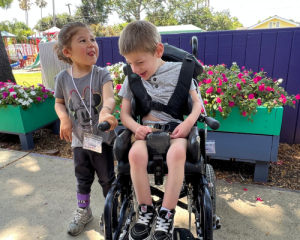Help your child regulate emotions with these simple mindfulness tips.
Teaching children emotional regulation is essential for ensuring that they can move through life without emotional outbursts that leave them feeling out of control. Emotional regulation is fundamental to developing autonomy, building healthy relationships and achieving goals. It is an important skill to build as it is also essential for mental and emotional health. Developing healthy emotional regulation takes time and effort.
Self-regulation refers to the ability to manage emotions and behaviors in ways that are appropriate for the situation. It does not mean suppressing emotions during the moment. Emotional regulation keeps us from acting out in highly emotional and reactive ways when we feel stressed, challenged or overstimulated. Here’s a look at five basic ways to help kids build their emotional regulation skills.
1. Mindful Modeling
Parents who cannot regulate their own emotions have difficulty helping their children to navigate their own emotional responses. Be mindful of your own healthy management of stress by reviewing any negative coping habits that you may be displaying in front of your children.
2. Use Self-Reflection
One of the best ways to begin the process of working through self-regulation with a child is to do play-by-play reviews of what went wrong with a reaction. This is not meant to judge or punish a child, it is instead used to walk the child through an outburst or overly emotional reaction that was out of proportion with a scenario to help them see where they lost control and what coping skills they could use next time.
For example, a child may have reacted by throwing a tantrum after being informed that they could not have candy. The parent in this situation could walk through the scenario with the child to help them understand why screaming or punching is not an appropriate reaction to not getting what they want.
3. Mindful Awareness of Knowing Their Brain
Children with poor emotional regulation often feel a sense of shame over not being able to control their emotions. They have never been informed about the ways that trauma, ADHD and the brain’s natural stress response contribute to poor regulation. Viewing the brain as a complex network that can be rewired with learning and practice helps them to feel empowered about participating in self-regulation building.
4. Practice Stressor Scenarios
Creating low-stakes practice runs for common triggering scenarios can be useful for helping children develop self-regulation. In the case of the child throwing a tantrum after not getting candy, the parent could plan a practice visit during a time when there’s no rush to get the grocery list done. The parent and child would then work through the emotions of seeing a desirable candy, asking and being told that it is not going to be purchased today. Experiencing these practice feelings in a controlled setting helps the child to work through the process of communicating their emotions of disappointment.
5. Introduce a Mindfulness Hack
Mindfulness practices can be especially helpful for kids in the early stages of developing self-regulation because these practices hack the brain. There’s no need to learn complex meditations! The 5-4-3-2-1 Mindfulness Hack is one of the easiest tools to teach children in need of help with self-regulation. I personally use it when I can’t fall asleep. When feeling overwhelmed, children can devote their attention to finding five things they can see, four things they can physically touch, three things they can hear, two things they can smell, and one thing they can taste in the moment.
A little attention with intention can go a long way in shaping how children react to a situation. Developing healthy emotional regulation takes time and effort but it is the key to a strong foundation.

Anthony Cupo is a trained mindfulness facilitator (TMF) from the UCLA Semel Institute for Neuroscience and Human Behavior. He is a co-owner of Stepping Forward Counseling Center, LLC, and has been meditating for over 30 years.













Leave a Reply